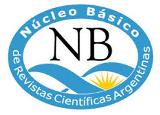Political speeches and political identities: production, articulation and reception in the works of Eliseo Veron and Ernesto Laclau
Keywords:
Laclau, Verón, discourse, hegemony, identity collectivesAbstract
This work is a reflection on the scope, limitations and possible dialogue between the works of two authors who made of “discourse” a central category in their intellectual projects: Eliseo Verón and Ernesto Laclau. The main objective is to investigate on their respective works, analyze the conceptual movements around the notions of “discourse” and discuss their potential for thinking the political logics and the dynamics of construction of social groups in the contemporary world. In particular, we propose the integration of their contributions to a conception of political discourse analysis which examine the conditions of production, modes of articulation of speech and it is conditions of reception, so we hope to contribute to the understanding of the relationship of political discourse in the formation of collective identity and contest for hegemony.
Downloads
Downloads
How to Cite
Issue
Section
License
The acceptance of an original by the journal implies the non-exclusive transfer of the economic rights of the authors in favor of the editor, who allows reuse, after editing (postprint), under a Creative Commons Attribution License -NonCommercial-ShareAlike 4.0 International (CC BY-NC-SA 4.0)
In accordance with these terms, the material can be shared (copied and redistributed in any medium or format) and adapted (remixed, transformed and created from the material another work), provided that a) the authorship and original source of its publication (magazine and URL of the work), b) is not used for commercial purposes and c) the same license terms are maintained.
The transfer of non-exclusive rights implies that after its publication (postprint) in Cuadernos de H ideas the authors can publish their work in any language, medium and format; in such cases, it is requested that it be stated that the material was originally published in this journal.
Such assignment also implies the authorization of the authors for the work to be harvested by SEDICI, the institutional repository of the National University of La Plata, and be disseminated in the databases that the editorial team considers appropriate for increase the visibility of the publication and its authors.
Likewise, the journal encourages the authors so that after their publication in Cuadernos de H ideas they deposit their productions in other institutional and thematic repositories, under the principle that offering society scientific and academic production without restrictions contributes to a greater exchange of global knowledge.










.png)

























